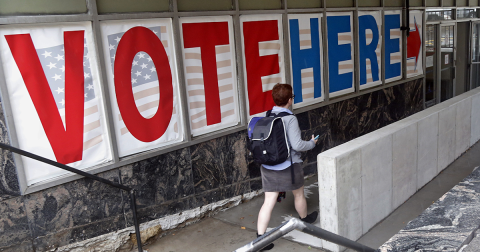Increasing polarization is raising concerns over the integrity of elections. Voters find themselves election after election faced with the question: Should elected officials loyal to their party call the balls and strikes for their own team in elections?
Washington independent secretary of state candidate Julie Anderson believes that election administration should be nonpartisan, both in nature and name.
Anderson is running in a special election triggered by the resignation of Republican Kim Wyman back in November 2021. The position is currently held by Steve Hobbs, a Democrat appointed by Governor Jay Inslee.
Anderson says her campaign is nonpartisan “not just in name, but in face.” She is not taking any money from political institutions affiliated with the Republican and Democratic Parties, which is an unprecedented move in a statewide race.
The secretary of state oversees and certifies elections in most states. Anderson has plenty of experience in this area. She has served as county auditor for Pierce County, Washington’s second-largest county, which handles the management of elections in the jurisdiction.
Anderson was also the first nonpartisan auditor elected in her county.
“In Pierce County, our charter has been amended so that the county auditor position is specifically nonpartisan,” she said in an interview for IVN. “Voters understood the significance of parties not having a hold on the office because of the duties and nature of the work.”
The secretary of state, however, is not a nonpartisan position. The position, like in other states, is held by people who carry a party’s banner, whether that be a Republican or a Democrat.
“This is like a ballclub refereeing their own championship game,” said Anderson. “It just doesn’t make sense, and no one is going to trust balls and strikes being called if they knew the umpire was recruited by or was part of the other team.”
Partisan polarization continues to get worse, and with this comes growing distrust that the “other side” will call the game fairly. There is also mounting pressure in some parts of the country for officials to not certify election results under the guise of “fraud” or “election rigging.”
The 2020 presidential election may come to mind as a prime example of increased claims of illegitimate elections. The election, however, poured gasoline on a fire that was already building nationwide.
More recently, the Otero County Commission in New Mexico refused to certify the 2022 primary election results in a special meeting on June 13. The Republican-led commission raised issues with Dominion Voting Machines, which were also used in election fraud claims during the 2020 presidential election cycle.
New Mexico Secretary of State's office claimed the commission acted out of legal procedure to do this, and a court order was issued requiring the commission to certify the primary results.
“When you sign up to be a member of the Democratic or Republican Parties, you are signing on to a team,” said Anderson. “Not just their policy framework, but you are supporting each other and you are acting as a pack.”
“It’s very difficult for voters to believe that once you walk into the office you shed those team obligations.”
Anderson believes that with the degree to which extreme polarization has shaped how people view elections, Wyman may be the last person voters across the board trust to be a member of a party and still call elections fairly.
“She brought with her the resume and background that I have, which is coming through the work,” remarked Anderson. “That gained her trust and she didn’t disabuse the trust.”
“But in this election I don’t see how people are going to trust a partisan in the position, even if you have a great resume.”
Not only does Anderson support making the secretary of state a nonpartisan position, but she also supports local options for non-charter counties to make their election administration positions nonpartisan, and a code of conduct for the secretary of state that prohibits the person in that position from running for a different office during their term.
“A lot of what we have seen around the United States that has been fueling the distrust are secretaries of state who use their office to gain ground to run for governor or a congressional seat,” she said.
Washington is one of three states that use nonpartisan primaries for the state’s executive offices, and was the first state to adopt the top-two system. This means all candidates and voters, regardless of party participate on a single ballot and the top two vote-getters move on to the general election.
Anderson believes this primary system is helpful for her campaign, even without the institutional support of a political party. She said the hardest question to overcome is electability.
She explained that there are people on both sides of the aisle to understand the need for “competence and focus.” It’s the concerns over electability and vote splitting in the primary though that are giving people pause.
“They’re worried that we have one mainstream Republican and one mainstream Democrat and that a vote for me is going to pull the rug out from under their partisan favorite,” said Anderson. “They prefer me, but are concerned about the vote splitting.”
She added that her strongest supporters are young people who feel like the two parties have failed them and they want an alternative.
A win for her campaign could change how voters view electability and could pave the way for future independent candidates and other candidates outside the Republican and Democratic Parties. All it takes is one to show people that it is possible.
“I think that is why the parties are going to fight so hard against me,” Anderson said. “They are losing a little bit of their franchise if I prevail.”
The primary for the special election will be held on August 2, 2022.
